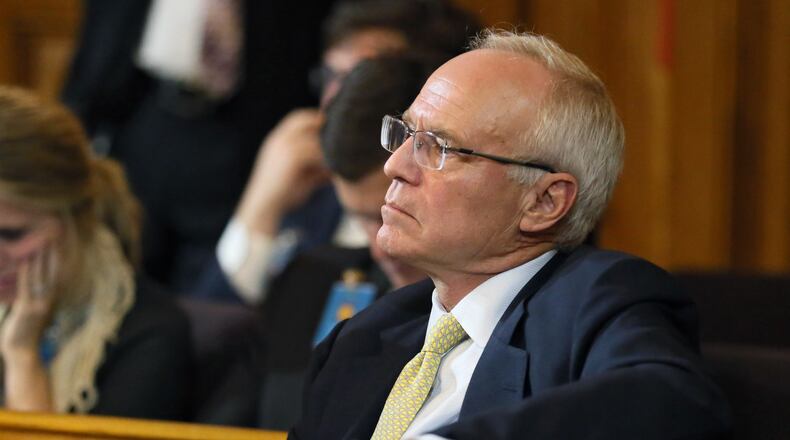Much to the consternation of some leading lawmakers, many rural hospitals have moved quickly to sign up a controversial consultant to market a new program that will provide $180 million in state-subsidized donations to struggling medical facilities.
Legislators say that could mean hundreds of thousands, if not millions, of dollars that the General Assembly meant for small-town hospitals will be paid to the consultant’s business instead.
"It was all of our intentions that all of those dollars go to help rural hospitals," said House Appropriations Chairman Terry England, R-Auburn, one of several top lawmakers to criticize the consulting deals.
Jim Kelly, who heads the Georgia HEART Hospital Program and also founded a state tax-credit-funded organization for private school scholarships, said that in the past few months he has signed up 32 of the 49 eligible rural hospitals.
“By offering tax-credit pre-approval application and contribution marketing, processing and reporting services,” Kelly said, “Georgia HEART is dedicated to the success of the rural hospital expense tax-credit program.
“We are providing valuable services to our 32 participating rural hospitals and are confident that, if asked by their legislators, hospital officials will express a desire for being able to continue to engage Georgia HEART.”
Kelly said Monday that any income his group earns — after salaries and other expenses are paid — would go to a foundation he started and his wife leads to support rural health care programs.
Many rural hospitals have struggled for years. Since 2013, at least five small-town hospitals in Georgia have closed, according to Georgia Health News, an online site that reports on state health care issues.
Lawmakers have long debated what to do about the problem. The lack of medical options threatens not only the health of small-town Georgians, but their economies as well, since businesses may be reluctant to move or expand in areas without adequate facilities.
Lawmakers thought they'd found a way to help keep struggling rural hospitals afloat by offering $180 million in state tax credits to donors who contribute to small-town medical centers.
The idea was to give Georgians and companies a tax break as an incentive to donate to their local small-town hospital.
A tax credit directly reduces the taxes someone owes.
Qualified hospitals can get up to $4 million in donations eligible for tax credits. The credits will be awarded on a first-come, first-served basis. The state is allocating $50 million for the tax credits next year, $60 million in 2018 and $70 million in 2019.
Kelly said some hospitals may start receiving donations through the program by February.
But top lawmakers fear payments to consultants such as Kelly will unnecessarily siphon away money that could go to modernizing emergency rooms and updating technology.
Kelly will charge hospitals 6 percent of what they receive in donations, which is about the same amount his student scholarship organization receives for administration..
England said he has been talking to top lawmakers about how to address Kelly’s involvement in the tax-credit program when the General Assembly begins meeting in January.
While he didn’t have any details, England told The Atlanta Journal-Constitution, “We are probably going to try to do something about it.”
As chairman of the House budget-writing committee, England has a lot of say over how billions of dollars in health care funding is spent. And his counterpart, Senate Appropriations Chairman Jack Hill, R-Reidsville, has also voiced opposition to rural hospitals signing up with consultants such as Kelly to handle the program.
But the Georgia Hospital Association and Georgia Chamber of Commerce — the state's business lobby — have partnered with Kelly's Georgia HEART, so he has some powerful political allies as well.
Kelly says many small hospitals simply don’t have the staff or expertise to run a fundraising campaign and do the paperwork needed to comply with the tax-credit program.
Top lawmakers involved in the effort say there is minimal paperwork involved and hospitals shouldn’t need extra staff or consultants to attract and collect the donations.
But tax law compliance is seldom simple. The state Department of Revenue has posted a 51-minute tutorial on how to apply and report the tax credits.
Complicated or not, tax credit programs can be extremely popular with potential donors. The cap for the private school scholarship tax credit was met on Jan. 1 the past few years — the first day it could be filed for — because so many people and businesses applied.
The idea that an organization such as Kelly’s would earn money from a state tax-credit program also isn’t new. His wife, Lisa, has long served as president of Georgia GOAL, the student scholarship organization he founded. She and others at some student scholarship organizations have been paid six-figure salaries through the taxpayer-subsidized program for years.
Still, Jimmy Lewis, the CEO of Hometown Health, a coalition of rural hospitals, said the state Department of Community Health's Office of Rural Health could save rural hospitals what they will be paying Kelly's business by handling the paperwork and marketing the program.
England said it would be cheaper for rural hospitals to hire full- and/or part-time staff to raise the money and handle the tax-credit program’s paperwork.
Kelly said he is already seeing interest from donors likely to apply for the credits during the first week of January.
He thinks the effort will reinvigorate rural hospital fundraising arms that have largely gone dormant.
As for legislators trying to stop Georgia HEART from getting paid to consult for rural hospitals, Kelly said his firm doesn’t have a long-term hold on the facilities. The 32 hospitals that have signed up for Georgia HEART’s services can terminate their agreement with 60 days’ notice.
“If, in the future, some of our Georgia HEART-participating hospitals can afford to hire development and administrative personnel to exclusively handle the tax-credit pre-approval applications and contribution marketing, processing and reporting, at no charge, we will help hospitals make the transition,” he said.
About the Author
Keep Reading
The Latest
Featured



